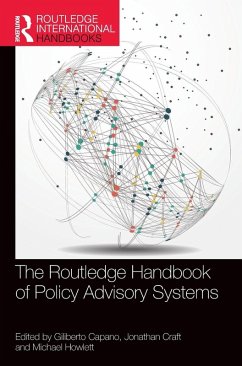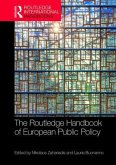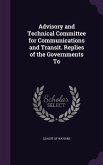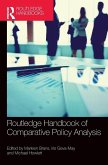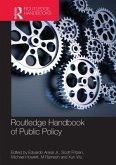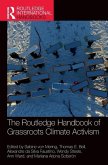The Routledge Handbook of Policy Advisory Systems
Herausgeber: Capano, Giliberto; Howlett, Michael; Craft, Jonathan
The Routledge Handbook of Policy Advisory Systems
Herausgeber: Capano, Giliberto; Howlett, Michael; Craft, Jonathan
- Gebundenes Buch
- Merkliste
- Auf die Merkliste
- Bewerten Bewerten
- Teilen
- Produkt teilen
- Produkterinnerung
- Produkterinnerung
This handbook comprehensively reflects, presents and summarises both first and second wave scholarship into Policy Advisory Systems (PAS).
Andere Kunden interessierten sich auch für
![The Routledge Handbook of European Public Policy The Routledge Handbook of European Public Policy]() The Routledge Handbook of European Public Policy263,99 €
The Routledge Handbook of European Public Policy263,99 €![Advisory and Technical Committee for Communications and Transit. Replies of the Governments to Advisory and Technical Committee for Communications and Transit. Replies of the Governments to]() Advisory and Technical Committee for Communications and Transit. Replies of the Governments to28,99 €
Advisory and Technical Committee for Communications and Transit. Replies of the Governments to28,99 €![Routledge Handbook of Comparative Policy Analysis Routledge Handbook of Comparative Policy Analysis]() Routledge Handbook of Comparative Policy Analysis271,99 €
Routledge Handbook of Comparative Policy Analysis271,99 €![Routledge Handbook of Public Policy Routledge Handbook of Public Policy]() Routledge Handbook of Public Policy272,99 €
Routledge Handbook of Public Policy272,99 €![The Routledge Handbook of Grassroots Climate Activism The Routledge Handbook of Grassroots Climate Activism]() The Routledge Handbook of Grassroots Climate Activism306,99 €
The Routledge Handbook of Grassroots Climate Activism306,99 €![The Routledge Handbook of Arctic Governance The Routledge Handbook of Arctic Governance]() The Routledge Handbook of Arctic Governance281,99 €
The Routledge Handbook of Arctic Governance281,99 €![The Routledge Handbook of Justice and Home Affairs Research The Routledge Handbook of Justice and Home Affairs Research]() The Routledge Handbook of Justice and Home Affairs Research263,99 €
The Routledge Handbook of Justice and Home Affairs Research263,99 €-
-
-
This handbook comprehensively reflects, presents and summarises both first and second wave scholarship into Policy Advisory Systems (PAS).
Produktdetails
- Produktdetails
- Verlag: Routledge
- Seitenzahl: 696
- Erscheinungstermin: 30. September 2025
- Englisch
- Abmessung: 250mm x 175mm x 42mm
- Gewicht: 1360g
- ISBN-13: 9781032737454
- ISBN-10: 103273745X
- Artikelnr.: 73776326
- Herstellerkennzeichnung
- Libri GmbH
- Europaallee 1
- 36244 Bad Hersfeld
- gpsr@libri.de
- Verlag: Routledge
- Seitenzahl: 696
- Erscheinungstermin: 30. September 2025
- Englisch
- Abmessung: 250mm x 175mm x 42mm
- Gewicht: 1360g
- ISBN-13: 9781032737454
- ISBN-10: 103273745X
- Artikelnr.: 73776326
- Herstellerkennzeichnung
- Libri GmbH
- Europaallee 1
- 36244 Bad Hersfeld
- gpsr@libri.de
Giliberto Capano is Professor of Political Science and Public Policy at the University of Bologna, Italy. Jonathan Craft is Associate Professor in the Department of Political Science and Munk School of Global Affairs and Public Policy, at the University of Toronto, Canada. Michael Howlett is the Burnaby Mountain Professor and Canada Research Chair (Tier 1) in the Department of Political Science at Simon Fraser University, Canada.
Introduction - Policy Advisory Systems: Research Agendas and Comparative
Approaches Part 1: Policy Advisory Systems in a Changing World: Concepts,
Importance and The State of the Research Section I - Introduction
(Background and Problematic) 1. A Diversifying Market for Public Policy
Advice: Demand, Supply and the Challenges of AI-Generated Government Advice
2. Policy Advice and the Public Service in a Changing World 3. Citizens as
Policy Advisors: Public Opinion as Policy Advice 4. The State of the Art of
Policy Advisory System Research: Mapping of Performance, Themes, and Key
Actors of the Field Part 2: Policy Advisory System Basics: Composition,
Location and Dynamics Section I: PAS Composition: The Nature of Policy
Experts and Policy Advice 5. Location and Content in Policy Advisory
Systems 6. Actors in Policy Advisory Systems: Instrument Constituencies,
Epistemic Communities 7. Policy Advice by Bureaucrats 8. The Role and Types
of Expert Bodies in Policy Advisory Systems Section II - PAS Locations:
National, Sub-National and International 9. Moving beyond Westminster:
Expansion and comparison in the study of national policy advisory systems
10. Why Study Sub-national Policy Advisory Systems? 11. Policy advisory
systems at the nexus between policy areas 12. How Do International
Bureaucrats Affect Policy Outputs? Studying Administrative Influence
Strategies in International Organizations Section III - Changes in PAS
Membership and Activities 13. Policy Advisory System Dynamics: Changes in
the Nature of Policy Advisors and Advice in Contemporary Government 14.
Political demand and policy advice: A framework for analysis 15. Ideational
change in Policy Advisory Systems: The role of external advisors in
fostering professional expertise in Public Administration 16. The
governance of policy advisory systems: Comparison of OECD countries Part 3:
PAS Trends: Politization, Externalization and Internationalization Section
I - Politicization: Changes in PAS Components 17. Ministerial Advisers and
Policy Advisory Systems 18. The 'mixed bag' of ministerial advisers:
Reflecting on their role profiles in the policy advisory system 19. The
Hearts and Brains of Policy Advisory Systems: Ministerial Advisers,
Ministerial Offices and Executive Triangles 20. Public inquiries as
advisory policy tools Section II - Externalization: Changes in Non-State
Actors 21. Externalization of policy advice: From inside to outside
government (and back?) 22. Think tanks and strategic policy-making: The
contribution of think tanks to policy advisory systems 23. Professionals in
global tax battles: Powering ideas through expertise 24. Academics in the
Policy Advisory System: Evidence from a Survey of Canadian Universities
Section III - Internationalization: The Changing Role of International
Organizations in PAS 25. The role of the International Monetary Fund in
policy advisory systems 26. The boundary work of international
organizations: Exclusive expertise 27. The OECD's Emulationist and the
World Bank's Universalist Approach to Policy Brokerage: A Matter of Style
28. The Demand for Advice at the European Union Level: Policy Advice
Politicization in the European Commission Part 4: Variations and
Developments in National Structure and Behavior Section I - PAS in Higher
Capacity Countries 29. Transformation in Whitehall policy advice systems?
Learning from three decades of reform 30. Policy Advise Paradoxes in
France: So many advisors, experts and courtesans speaking (un-)true to
power in a vertical 'republican monarchy' 31. Dynamics of change in
internal policy advisory systems: The hybridization of advisory capacities
in Germany 32. Providing Advice to Australian Government Section II - Cases
of Lower Capacity Countries 33. The Involution of Policy Advisory System in
Russia: Formation, Development, and Degradation 34 The Iranian Policy
Advisory System: Marginal Externalization and Political Conservatism 35.
Policy Advisory System in Turkey: Policy Advice in an Authoritarian Setting
36. Knowledge representation of national expert and advisory committees in
China Part 5: Future Trends in PAS Research and Practice Section I - Issues
in PAS Management and Quality 37. Theorizing PAS Management: New Directions
and Old Haunts 38. Understanding the connection between government and
policy advisory bodies at arm's length: Contested Autonomy 39. Features
informing the development of an optimal policy advisory system: Based on
the best available advice? 40. What Makes a Good Policy Advice System? The
Effects of Exit, Voice and Loyalty on Advisory System Diversity Section II
- Future Issues in PAS Research 41. Tempo, Intensity, and Sequence in
Policy Advisory Systems: In Search of More Nuanced Dynamics 42. The
Challenges of Policy Advice in Turbulent Era: Legitimacy, Values and
Politics 43. Advising Ministers in the digital era 44. Reconsidering advice
and advisory systems in the governance era
Approaches Part 1: Policy Advisory Systems in a Changing World: Concepts,
Importance and The State of the Research Section I - Introduction
(Background and Problematic) 1. A Diversifying Market for Public Policy
Advice: Demand, Supply and the Challenges of AI-Generated Government Advice
2. Policy Advice and the Public Service in a Changing World 3. Citizens as
Policy Advisors: Public Opinion as Policy Advice 4. The State of the Art of
Policy Advisory System Research: Mapping of Performance, Themes, and Key
Actors of the Field Part 2: Policy Advisory System Basics: Composition,
Location and Dynamics Section I: PAS Composition: The Nature of Policy
Experts and Policy Advice 5. Location and Content in Policy Advisory
Systems 6. Actors in Policy Advisory Systems: Instrument Constituencies,
Epistemic Communities 7. Policy Advice by Bureaucrats 8. The Role and Types
of Expert Bodies in Policy Advisory Systems Section II - PAS Locations:
National, Sub-National and International 9. Moving beyond Westminster:
Expansion and comparison in the study of national policy advisory systems
10. Why Study Sub-national Policy Advisory Systems? 11. Policy advisory
systems at the nexus between policy areas 12. How Do International
Bureaucrats Affect Policy Outputs? Studying Administrative Influence
Strategies in International Organizations Section III - Changes in PAS
Membership and Activities 13. Policy Advisory System Dynamics: Changes in
the Nature of Policy Advisors and Advice in Contemporary Government 14.
Political demand and policy advice: A framework for analysis 15. Ideational
change in Policy Advisory Systems: The role of external advisors in
fostering professional expertise in Public Administration 16. The
governance of policy advisory systems: Comparison of OECD countries Part 3:
PAS Trends: Politization, Externalization and Internationalization Section
I - Politicization: Changes in PAS Components 17. Ministerial Advisers and
Policy Advisory Systems 18. The 'mixed bag' of ministerial advisers:
Reflecting on their role profiles in the policy advisory system 19. The
Hearts and Brains of Policy Advisory Systems: Ministerial Advisers,
Ministerial Offices and Executive Triangles 20. Public inquiries as
advisory policy tools Section II - Externalization: Changes in Non-State
Actors 21. Externalization of policy advice: From inside to outside
government (and back?) 22. Think tanks and strategic policy-making: The
contribution of think tanks to policy advisory systems 23. Professionals in
global tax battles: Powering ideas through expertise 24. Academics in the
Policy Advisory System: Evidence from a Survey of Canadian Universities
Section III - Internationalization: The Changing Role of International
Organizations in PAS 25. The role of the International Monetary Fund in
policy advisory systems 26. The boundary work of international
organizations: Exclusive expertise 27. The OECD's Emulationist and the
World Bank's Universalist Approach to Policy Brokerage: A Matter of Style
28. The Demand for Advice at the European Union Level: Policy Advice
Politicization in the European Commission Part 4: Variations and
Developments in National Structure and Behavior Section I - PAS in Higher
Capacity Countries 29. Transformation in Whitehall policy advice systems?
Learning from three decades of reform 30. Policy Advise Paradoxes in
France: So many advisors, experts and courtesans speaking (un-)true to
power in a vertical 'republican monarchy' 31. Dynamics of change in
internal policy advisory systems: The hybridization of advisory capacities
in Germany 32. Providing Advice to Australian Government Section II - Cases
of Lower Capacity Countries 33. The Involution of Policy Advisory System in
Russia: Formation, Development, and Degradation 34 The Iranian Policy
Advisory System: Marginal Externalization and Political Conservatism 35.
Policy Advisory System in Turkey: Policy Advice in an Authoritarian Setting
36. Knowledge representation of national expert and advisory committees in
China Part 5: Future Trends in PAS Research and Practice Section I - Issues
in PAS Management and Quality 37. Theorizing PAS Management: New Directions
and Old Haunts 38. Understanding the connection between government and
policy advisory bodies at arm's length: Contested Autonomy 39. Features
informing the development of an optimal policy advisory system: Based on
the best available advice? 40. What Makes a Good Policy Advice System? The
Effects of Exit, Voice and Loyalty on Advisory System Diversity Section II
- Future Issues in PAS Research 41. Tempo, Intensity, and Sequence in
Policy Advisory Systems: In Search of More Nuanced Dynamics 42. The
Challenges of Policy Advice in Turbulent Era: Legitimacy, Values and
Politics 43. Advising Ministers in the digital era 44. Reconsidering advice
and advisory systems in the governance era
Introduction - Policy Advisory Systems: Research Agendas and Comparative
Approaches Part 1: Policy Advisory Systems in a Changing World: Concepts,
Importance and The State of the Research Section I - Introduction
(Background and Problematic) 1. A Diversifying Market for Public Policy
Advice: Demand, Supply and the Challenges of AI-Generated Government Advice
2. Policy Advice and the Public Service in a Changing World 3. Citizens as
Policy Advisors: Public Opinion as Policy Advice 4. The State of the Art of
Policy Advisory System Research: Mapping of Performance, Themes, and Key
Actors of the Field Part 2: Policy Advisory System Basics: Composition,
Location and Dynamics Section I: PAS Composition: The Nature of Policy
Experts and Policy Advice 5. Location and Content in Policy Advisory
Systems 6. Actors in Policy Advisory Systems: Instrument Constituencies,
Epistemic Communities 7. Policy Advice by Bureaucrats 8. The Role and Types
of Expert Bodies in Policy Advisory Systems Section II - PAS Locations:
National, Sub-National and International 9. Moving beyond Westminster:
Expansion and comparison in the study of national policy advisory systems
10. Why Study Sub-national Policy Advisory Systems? 11. Policy advisory
systems at the nexus between policy areas 12. How Do International
Bureaucrats Affect Policy Outputs? Studying Administrative Influence
Strategies in International Organizations Section III - Changes in PAS
Membership and Activities 13. Policy Advisory System Dynamics: Changes in
the Nature of Policy Advisors and Advice in Contemporary Government 14.
Political demand and policy advice: A framework for analysis 15. Ideational
change in Policy Advisory Systems: The role of external advisors in
fostering professional expertise in Public Administration 16. The
governance of policy advisory systems: Comparison of OECD countries Part 3:
PAS Trends: Politization, Externalization and Internationalization Section
I - Politicization: Changes in PAS Components 17. Ministerial Advisers and
Policy Advisory Systems 18. The 'mixed bag' of ministerial advisers:
Reflecting on their role profiles in the policy advisory system 19. The
Hearts and Brains of Policy Advisory Systems: Ministerial Advisers,
Ministerial Offices and Executive Triangles 20. Public inquiries as
advisory policy tools Section II - Externalization: Changes in Non-State
Actors 21. Externalization of policy advice: From inside to outside
government (and back?) 22. Think tanks and strategic policy-making: The
contribution of think tanks to policy advisory systems 23. Professionals in
global tax battles: Powering ideas through expertise 24. Academics in the
Policy Advisory System: Evidence from a Survey of Canadian Universities
Section III - Internationalization: The Changing Role of International
Organizations in PAS 25. The role of the International Monetary Fund in
policy advisory systems 26. The boundary work of international
organizations: Exclusive expertise 27. The OECD's Emulationist and the
World Bank's Universalist Approach to Policy Brokerage: A Matter of Style
28. The Demand for Advice at the European Union Level: Policy Advice
Politicization in the European Commission Part 4: Variations and
Developments in National Structure and Behavior Section I - PAS in Higher
Capacity Countries 29. Transformation in Whitehall policy advice systems?
Learning from three decades of reform 30. Policy Advise Paradoxes in
France: So many advisors, experts and courtesans speaking (un-)true to
power in a vertical 'republican monarchy' 31. Dynamics of change in
internal policy advisory systems: The hybridization of advisory capacities
in Germany 32. Providing Advice to Australian Government Section II - Cases
of Lower Capacity Countries 33. The Involution of Policy Advisory System in
Russia: Formation, Development, and Degradation 34 The Iranian Policy
Advisory System: Marginal Externalization and Political Conservatism 35.
Policy Advisory System in Turkey: Policy Advice in an Authoritarian Setting
36. Knowledge representation of national expert and advisory committees in
China Part 5: Future Trends in PAS Research and Practice Section I - Issues
in PAS Management and Quality 37. Theorizing PAS Management: New Directions
and Old Haunts 38. Understanding the connection between government and
policy advisory bodies at arm's length: Contested Autonomy 39. Features
informing the development of an optimal policy advisory system: Based on
the best available advice? 40. What Makes a Good Policy Advice System? The
Effects of Exit, Voice and Loyalty on Advisory System Diversity Section II
- Future Issues in PAS Research 41. Tempo, Intensity, and Sequence in
Policy Advisory Systems: In Search of More Nuanced Dynamics 42. The
Challenges of Policy Advice in Turbulent Era: Legitimacy, Values and
Politics 43. Advising Ministers in the digital era 44. Reconsidering advice
and advisory systems in the governance era
Approaches Part 1: Policy Advisory Systems in a Changing World: Concepts,
Importance and The State of the Research Section I - Introduction
(Background and Problematic) 1. A Diversifying Market for Public Policy
Advice: Demand, Supply and the Challenges of AI-Generated Government Advice
2. Policy Advice and the Public Service in a Changing World 3. Citizens as
Policy Advisors: Public Opinion as Policy Advice 4. The State of the Art of
Policy Advisory System Research: Mapping of Performance, Themes, and Key
Actors of the Field Part 2: Policy Advisory System Basics: Composition,
Location and Dynamics Section I: PAS Composition: The Nature of Policy
Experts and Policy Advice 5. Location and Content in Policy Advisory
Systems 6. Actors in Policy Advisory Systems: Instrument Constituencies,
Epistemic Communities 7. Policy Advice by Bureaucrats 8. The Role and Types
of Expert Bodies in Policy Advisory Systems Section II - PAS Locations:
National, Sub-National and International 9. Moving beyond Westminster:
Expansion and comparison in the study of national policy advisory systems
10. Why Study Sub-national Policy Advisory Systems? 11. Policy advisory
systems at the nexus between policy areas 12. How Do International
Bureaucrats Affect Policy Outputs? Studying Administrative Influence
Strategies in International Organizations Section III - Changes in PAS
Membership and Activities 13. Policy Advisory System Dynamics: Changes in
the Nature of Policy Advisors and Advice in Contemporary Government 14.
Political demand and policy advice: A framework for analysis 15. Ideational
change in Policy Advisory Systems: The role of external advisors in
fostering professional expertise in Public Administration 16. The
governance of policy advisory systems: Comparison of OECD countries Part 3:
PAS Trends: Politization, Externalization and Internationalization Section
I - Politicization: Changes in PAS Components 17. Ministerial Advisers and
Policy Advisory Systems 18. The 'mixed bag' of ministerial advisers:
Reflecting on their role profiles in the policy advisory system 19. The
Hearts and Brains of Policy Advisory Systems: Ministerial Advisers,
Ministerial Offices and Executive Triangles 20. Public inquiries as
advisory policy tools Section II - Externalization: Changes in Non-State
Actors 21. Externalization of policy advice: From inside to outside
government (and back?) 22. Think tanks and strategic policy-making: The
contribution of think tanks to policy advisory systems 23. Professionals in
global tax battles: Powering ideas through expertise 24. Academics in the
Policy Advisory System: Evidence from a Survey of Canadian Universities
Section III - Internationalization: The Changing Role of International
Organizations in PAS 25. The role of the International Monetary Fund in
policy advisory systems 26. The boundary work of international
organizations: Exclusive expertise 27. The OECD's Emulationist and the
World Bank's Universalist Approach to Policy Brokerage: A Matter of Style
28. The Demand for Advice at the European Union Level: Policy Advice
Politicization in the European Commission Part 4: Variations and
Developments in National Structure and Behavior Section I - PAS in Higher
Capacity Countries 29. Transformation in Whitehall policy advice systems?
Learning from three decades of reform 30. Policy Advise Paradoxes in
France: So many advisors, experts and courtesans speaking (un-)true to
power in a vertical 'republican monarchy' 31. Dynamics of change in
internal policy advisory systems: The hybridization of advisory capacities
in Germany 32. Providing Advice to Australian Government Section II - Cases
of Lower Capacity Countries 33. The Involution of Policy Advisory System in
Russia: Formation, Development, and Degradation 34 The Iranian Policy
Advisory System: Marginal Externalization and Political Conservatism 35.
Policy Advisory System in Turkey: Policy Advice in an Authoritarian Setting
36. Knowledge representation of national expert and advisory committees in
China Part 5: Future Trends in PAS Research and Practice Section I - Issues
in PAS Management and Quality 37. Theorizing PAS Management: New Directions
and Old Haunts 38. Understanding the connection between government and
policy advisory bodies at arm's length: Contested Autonomy 39. Features
informing the development of an optimal policy advisory system: Based on
the best available advice? 40. What Makes a Good Policy Advice System? The
Effects of Exit, Voice and Loyalty on Advisory System Diversity Section II
- Future Issues in PAS Research 41. Tempo, Intensity, and Sequence in
Policy Advisory Systems: In Search of More Nuanced Dynamics 42. The
Challenges of Policy Advice in Turbulent Era: Legitimacy, Values and
Politics 43. Advising Ministers in the digital era 44. Reconsidering advice
and advisory systems in the governance era

